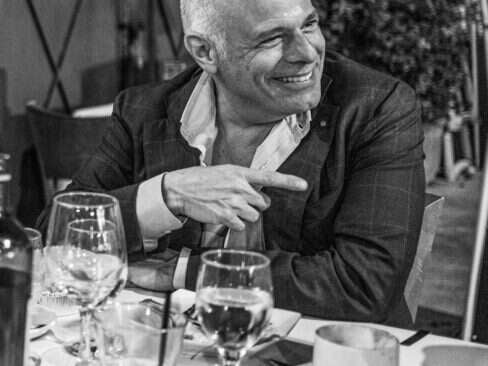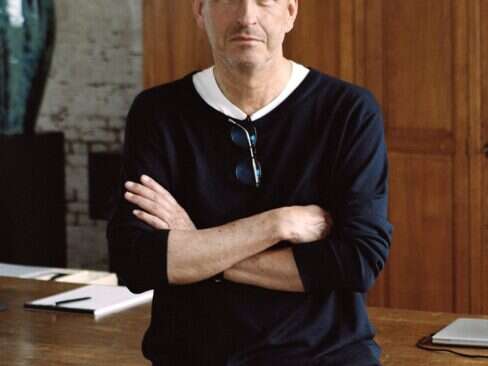Nicholas Clayton’s background prior to joining Dubai-based Jumeirah crossed three of luxury’s most successful but different brands. During a recent visit to New York Clayton met with Elite Traveler Editor-in-Chief Doug Gollan where he talked about Jumeirah’s future and his past with Ritz-Carlton, Mandarin Oriental and Viceroy and how it is helping him in his new role.
Elite Traveler: Are you in New York for any particular announcements?
Nicholas Clayton: (The big announcements were ) at the HICAP conference in Hong Kong, Gerald Lawless, our C.E.O. and president, along with the team, announced a number of hotel developments in China: Wu-Han, Nanjing, and all of that in complement to the other stuff we’d announced in Guangzhou, and elsewhere. It’s an appropriately late entry into China. In our hotel company’s maturity, this is our time to enter. The good thing about being a late entrant is seeing what our competition has done and maybe making some design and positioning differences. It certainly is at a time when supply is more plentiful than in the past, so we’ll have to work hard to fill the hotels and be successful.
We’re here [in New York] to thank our travel partners who’ve supported us, to keep them updated on our growth story. We just made an announcement of a new lifestyle brand in order to grow faster and to accommodate a more casual, millennial experience for the global travelers that we serve. We don’t want to miss some development opportunities because of Jumeirah specs and standards. Rather than compromise on those, we’re developing a brand that doesn’t cost as much to build, but delivers a fun, quality experience.
ET: Tell us about the new brand and what the plan is for that.
NC: It’s called Venu. Between now and 2020 something like 100 plus properties (overall) will be developed in Dubai. It’s a significant inventory change. Tourism is expected to double, that’s the ruler’s direction to the Dubai Tourism Authority. It’s a bold vision, but we believe it because he has made these kinds of directions before and they always seem to stick to the wall. We’re going to need a lot more properties, so if we didn’t have this second brand we’d be missing out on some of these opportunities. There’s also an age-specific focus.
ET: Any thoughts on seeing Jumeirah return to the American market?
NC: I have a vested interest in that. I was born in Pennsylvania but lived there a short period of time. I was raised in Las Vegas and spent time in Dallas-Fort Worth, and have been in a number of interesting places since then.
Last year, people were speaking fondly about our presence at the Essex House. I’d been to the Essex House as a customer outside of Jumeirah, and was struck that it was a solid hotel with a great location. Shortly after I joined we had to make some changes and make a transition possible for the seller.
The U.S. is a very attractive market for us for obvious reasons. It’s got huge domestic travel, huge international interest, especially in the cities you think would be the normal culprits. We’d like to be everywhere from the West to East coast in markets that support luxury travel. We’re not a big investor outside of Dubai. We have some big hotel projects that we’re doing as a company, and that’s our priority because we have great track record of making good returns in those markets.
ET: For the U.S. it sounds like nothing imminent, but you’re looking?
NC: Every couple of months something is brought to our attention. It requires the sun and moon to align in terms of the group being able to do the deal, to negotiate a management contract, etc. etc. It will happen, but it’s not imminent. We’ve seen stuff in Miami, Boston, L.A., and there was some discussion around a hotel in New York just a few months ago from an investor friendly to Jumeirah. Maybe they would be from our part of the world. Those sorts of things help us. When we were at Essex House, that’s how the opportunity came about in the first place. It was a relationship because we’re in the same ‘Dubai, Inc.’ if you will.
ET: How many properties does Jumeirah have open right now?
NC: We have 22.
ET: There was an 18-month period where Jumeirah doubled open hotels. What’s planned for the next few years?
NC: That growth was dramatic for us and was a combination of taking hotels over that wanted Jumeirah as their brand manager and actually opening specifically built Jumeirah hotels. It was both. That’s not unusual for a small company. If you wait to build each one of them, you’ll grow slower than taking some stuff over that wants a good brand and wants to fill its guestrooms with quality customers. Our pipeline is most active starting the second half of 2016. I have 2015 to consolidate, the first half of 2016 to gear up, and then we’re going to start at a 3 to 5 property-per-year clip from there. That will be properties in Nanjing, Ko Samui, multiple in Dubai, in China, Hainan, and Bali.
ET: When you open that many hotels that quickly in the luxury segment does it put pressure on continuing to deliver the service levels that one would expect from Jumeirah?
NC: There’s always a degree of learning when you enter a new market as a company. I think we learned when we came into New York, and we left wiser than when we came in. How we do business in Rome, Istanbul—there are nuances you learn. What’s always the same is to find the business leader, or general manger, to represent the ground, the brand, and the building blocks to represent the unit. That’s true in manufacturing or anything. You get the wrong one there, you can’t even help them; the center can only do so much. I’ve put general managers in places and just clapped because they know just what to do. They hired the right staff, have great owner relations, oversee the development of the hotel, and they can even tell you where the plumbing was. They just know how to do it.
There are issues beyond your control in delivering the developed, finished, defect-free product to our clients. What we’ve learned is that we have to have a zero compromise on that handover. It’s important for us to have a more rigid minimum standard of what is acceptable in that handover process. These are negotiations with the developer, developer-owner, and investor when they want to get the hotel open before it’s really ready. In Kuwait, for example, we held off on opening everything until we were certain. But it wasn’t apparent to the customer that the spa wasn’t open yet, meaning it wasn’t central to the hotel’s operating. It’s when fundamental pieces aren’t ready [that there’s a problem].
ET: Ritz-Carlton and Four Seasons became the two first global luxury brands, and you were there for the development for Mandarin in a similar way. Now there is a multitude of competitors in the marketplace. How does Jumeirah navigate this environment of numerous luxury brands?
NC: Jumeirah has, and is continuing to support Arabic heritage. It’s funny, I was in Shanghai talking to our owner, and he wants us to bring more of the region—the Middle East—into the hotel. It’s a little counter-intuitive. In the lobby there are historic pieces of art from China, and museum-quality pieces of relics from the history of China mixed with a beautiful digital display with dynamic art on the ceiling—this old and new China thing going on—and he also wanted us to bring an Arabic influence!
In my experience, Mandarin was the group that had the advantage where outside of Asia, they could celebrate Asian heritage and pull if off. Here at the New York Mandarin, you got a real hint of Asia. I think we can do more of that, and it would help educate the world on our region, and places like Dubai, which are new and dynamic and fresh.
I’d like to see us be a very effective commercial organization, everything from dynamic pricing to our PR, to marketing efforts. I don’t think you have to be a big company to be clever, in fact you can be nimble. Through our organizational strength we can do the restaurant piece more effectively. We have a critical mass of restaurants, we have a history of successful operations, and we simply need to pull the principles from Dubai where we operate successfully and implant that in our different locations.
ET: Where is Jumeirah going to be in 10 years?
NC: Between two brands, we have a ten-year plan for 100 properties. It’s a 75-25 split between Jumeirah and our new brand, Venu. Growth is essential to our strategy, and we’ve identified certain capabilities that we need for this growth. On the commercial side, that’s loyalty, pricing, and also our pre-opening capabilities, asking ‘how do you get a property up and running so that it hits the market with some steam?’ All of the things behind launching the new brand are a major project for us as well.
ET: And will Venue be five-star or alternative four-star?
NC: It will be lifestyle, which translates to a hotel that costs less to build and is more efficient, serves a developer and consumer market that is not looking for the cost of luxury. We have to have a starting point, which is lifestyle. We don’t want it to be a second luxury brand.
ET: Have you announced any locations outside of Dubai for the new brand?
One in Dubai and 20 in the pipeline.
ET: Viceroy, Mandarin, and Ritz Carlton are three very interesting stops. How would you contrast these brands to Jumeirah?
They share a lot in common. They all started with one hotel! All started as an idea. Usually their first hotels were strong. They make statements, they’re high profile. Our first hotels of course were in Dubai, one of the first being the Burj. We sit with a competitive advantage by having one hotel that will probably never be built again, in terms of style, architecture, and boldness of location on an island off the coast. Again, our Arabian heritage is a unique differentiator in a way that the Canadian heritage for Four Seasons never was. If we make a big focus on food and beverage and do that well that would be different than Four Seasons, different from Ritz-Carlton. Mandarin did a bit of that. We’ll be a similar story in some ways, and a very different one in other ways.
ET: What things are going to be necessities of service in catering to the luxury traveler?
NC: The industry has layered so much on top of the guest experience, its time to think about what to take off of those layers. I find that we have built in standards, almost as an industry, that can be perceived to be robotic, redundant, and of little value. For example: ‘Don’t repeat the order back to the customer.’ It’s so obviously annoying to people, and it doesn’t have any value. What you’re doing is you’re saying ‘I don’t know if I got it right, so I’m going to force you to participate in a testing exercise.’ I was in one of our restaurants and spoke with the restaurant group director, and said ‘make sure the servers realize that if after the first course, there aren’t crumbs and it looks clean, don’t just come over and wipe the table just to say you did.’
So what can we add that’s valuable, and maintain that’s valuable, and what should we think about taking away because, ‘you’re actually getting on my nerves.’ It’s counterintuitive because we’ve been layering all of these things on. I don’t know how many cold hand towels you can have in one place.
These best-in-class airlines have gotten into the same trap. It’s like knowing a play is about to happen and half of it doesn’t interest me—you could just cut that half off. I’ve been out in New York, servers have not been formal but they’ve been respectful, they look like they’re having some fun and they have good product knowledge. We need to build that confidence and competence in our people. The labor component is more reasonable in Asia-Pacific and the Middle East. When it’s more reasonable, you tend to use that as a tool when it may not serve the guest well.
ET: Does Jumeirah have its own training school for hospitality?
NC: The Academy is a degreed hotel program. So it’s on the level of Lausanne, without the rich, long history, but we actually partner with Lausanne. We have an accredited program, Masters, and Bachelor of business. We synergize with the Academy to do everything from culinary training to some of the more basic things, and we offer our colleagues quite a big consideration to come to the school, pay the tuition, and go through the programs there. It’s been very, very helpful. There are 350 students at any time, and it’s located right near Dubai.
ET: Any other news you’d like to mention?
NC: This year the Burj al-Arab is celebrating its 15th anniversary, and Madinat Jumeirah is celebrating its 10th. In Madinat we have new hotels coming up, and also a major refurbishment throughout the resort. At the Burj al-Arab, we’ll be announcing soon that it will have a new 150-meter luxury exclusive beach club on the island by the end of next year on the gulf-side. In fact we’re actually adding two, one on the island and one on the beach itself, so the Burj guests have access to two different beach clubs that will operate all through the day and night, and at night transform into a sort of barefoot chic experience.












